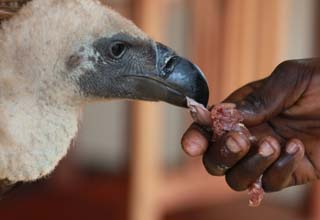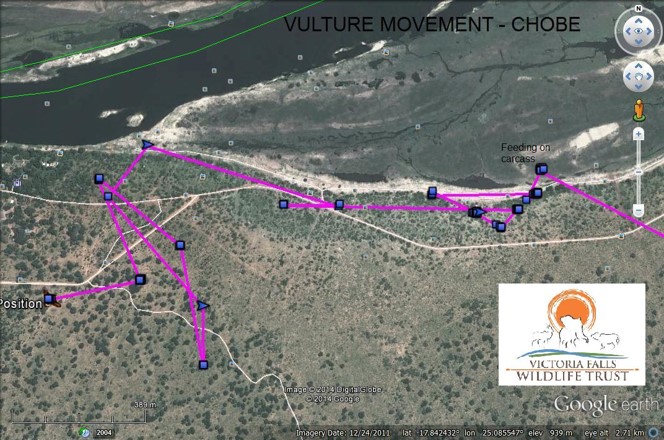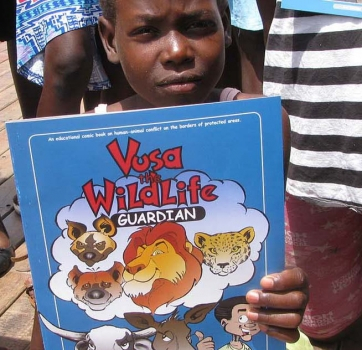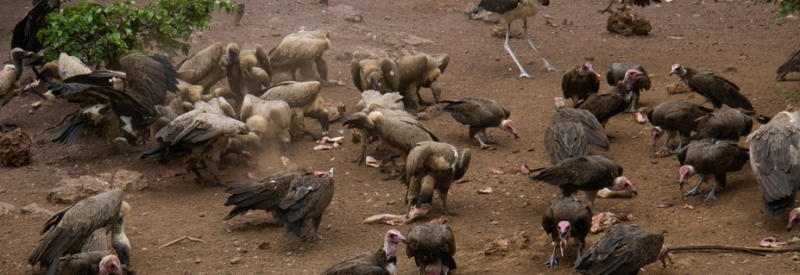In recent times vultures have seen a marked decline of many species. Poaching of these iconic birds through mass poisoning has led to major die offs throughout Sub-Saharan Africa. Unfortunately, power lines are also a key factor in the loss of many birds. Losses of vultures increases the spread of diseases such as rabies and anthrax which can have devastating effects on other wildlife populations. The IUCN has now listed all of the species of vultures found in Zimbabwe as either Endangered or Critically Endangered. The single largest threat to vultures in Zimbabwe is the malicious poisoning of wildlife.
The single largest threat to vultures in Zimbabwe is the malicious poisoning of wildlife.
Vultures are affected by poisoning in a number of ways:
Illegal poaching for wildlife trophies has recently become more sophisticated, with poachers now using cyanide and agricultural poisons as less conspicuous alternatives to firearms. Vultures can be unintentionally poisoned this way as they scavenge on poisoned meat. But more commonly, vulture poisoning is intentional: circling vultures are great sentinels for poached carcasses, and can alert wildlife authorities to the crime-scene, so poachers will often lace wildlife carcasses with poison to cover their tracks. A single poisoned elephant can kill hundreds of vultures, and this can have huge cascading impacts on vulture populations.
Make a donation to help support vulture conservation.
Vulture Rehabilitation
Recent increases of poisoning incidents and human developments such as power lines has led to many sick, injured and orphaned vultures in the area. The Trust are in the process of trying to secure funding to build a permanent aviary facility to be able to accommodate these iconic birds when they come in for rehabilitation. The goal is to be able to return the rehabilitated birds back to the wild whenever possible. The Trust hopes to establish a long term care facility to handle these cases. Vultures like many raptors need to be able to build up muscle mass to fly large distances, this aviary would improve rehabilitation success of these birds back into the wild.
If you would like to donate funds to support us in building this new vulture aviary facility, please Contact Us!

“Judge” The Vulture Ambassador
In late December 2013 a white backed vulture fledgling was brought to the Victoria Falls Wildlife Trust facilities, it was very ill and unable to fly. Slowly we were able to improve the bird’s health and get it to both eat and drink on its own. Unfortunately, its wing was severely deformed. It is suspected the injury was a result of toxicity when it was still in the nest. The vulture (now called “Judge”) will never be able to fly. Therefore the Trust agreed to look after Judge for the remainder of her life. Judge loves to be around people and enjoys keeping an eye on what is happening around the Trust’s facilities. She is exercised daily and through training, has become an ambassador for vultures with our conservation education program.
For more information about Judge please click here.
Vultures are sentinels for poaching, clean-up-crews for disease and they play an important role in biodiversity.
Vulture Population Research
Vultures have been severely affected by all the recent poisoning incidents in Zimbabwe, however it is still unclear to what extent vulture populations are declining as a result of this.
A key aspect to conserving these magnificent birds it to determine population numbers of each species, and important areas for breeding. Here in North West Zimbabwe, the Victoria Falls Wildlife Trust since 2014 has been working with Zimbabwe Parks and Wildlife Management Authority to undertake population surveys of vulture nesting sites, numbers and species during breeding seasons. This research data will provide baseline information to assist local wildlife authorities in making conservation management decisions on how to improve the conservation status of vultures in the region.
In addition to the population survey, the Trust, working together with South African NPO VulPro, has initiated a project to monitor the spatial movements of vultures. As these magnificent birds travel over large distances in conservation areas, they play vital roles in these areas as sentinels for poaching, clean-up crews for disease and play an important role in biodiversity.
If you would like to help us conserve these amazing animals, you can do so by sponsoring a solar tracking unit. Each unit will be fitted on a bird and the movements of this animal will be closely monitored. One unit costs approximately USD $3,500.

If you would like to sponsor a vulture tracking unit please visit our Donate page.
Vulture Focus in Education

If we are to be successful in conserving vultures, discussing the problems that vulture populations are facing with people, is critical to their long-term conservation. Therefore the Victoria Falls Wildlife Trust has made it a focus of the conservation education program we run for local school children. Every child takes home a booklet which discusses the benefits of wildlife and the role vultures play in the ecosystem. The booklet highlights the decline of vultures due to poisoning and poaching and offers a hotline for people to phone if they know of any sick or injured vultures.
Vulture Restaurants
Educating visitors to Victoria Falls about the need for vulture conservation, is important to spread international awareness. The Victoria Falls Wildlife Trust has recently partnered with local tour operator Africa Albida Tourism to create a “Vulture Culture Experience”: a conservation project which strives to protect endangered vultures and educate visitors. Every day, at lunch time a professional guide takes visitors down to a viewing platform at the Victoria Falls Safari Lodge, to see wild vultures feeding on leftover meat scraps and bones from nearby restaurants. Guests get to watch as hundreds of vultures descend en masse to the ‘restaurant’ where they will learn more about the plight of vultures across Africa and the crucial role they play in our ecosystem. A small donation is given to the Trust for each lunch that is purchased at the AAT Vulture Culture restaurant, which helps to support our vulture conservation research.





